16 June 2020
Originally published
06 February 2020
Source
As the EU border agency prepares to expand its operations in the Western Balkans, internal documents reveal that top brass consistently disregarded evidence of abuse of asylum seekers on the Hungarian-Serbian border.
The border guards were Hungarian but the dog handler was Finnish. Together, in the black of night, they were pursuing “irregular migrants” in a remote spot near Hungary’s southern frontier with Serbia.
The dog handler was there as a member of Frontex, the EU’s external border agency. Such joint operations had become common in the wake of the refugee and migrant crisis that first hit Europe in 2015.
Suddenly, someone jumped from the bushes. “The dog reacted by biting, which is a natural defence reaction for service dogs,” said a Frontex internal report filed shortly after the October 11, 2016 incident. The dog attack is a vivid example of what rights groups say amounts to a pattern of aiding and abetting the heavy-handed tactics of Hungarian authorities patrolling a key EU frontier.
Internal documents reviewed by BIRN show that the head of Frontex rejected a recommendation in 2016 from the agency’s own compliance watchdog to suspend operations on the Hungarian-Serbian border amid concerns of complicity in rights violations by Hungarian officers. Among the reported acts of brutality: the use of batons, teargas and pepper spray on asylum seekers — including children — and violent “pushbacks” of refugees and migrants into northern Serbia.
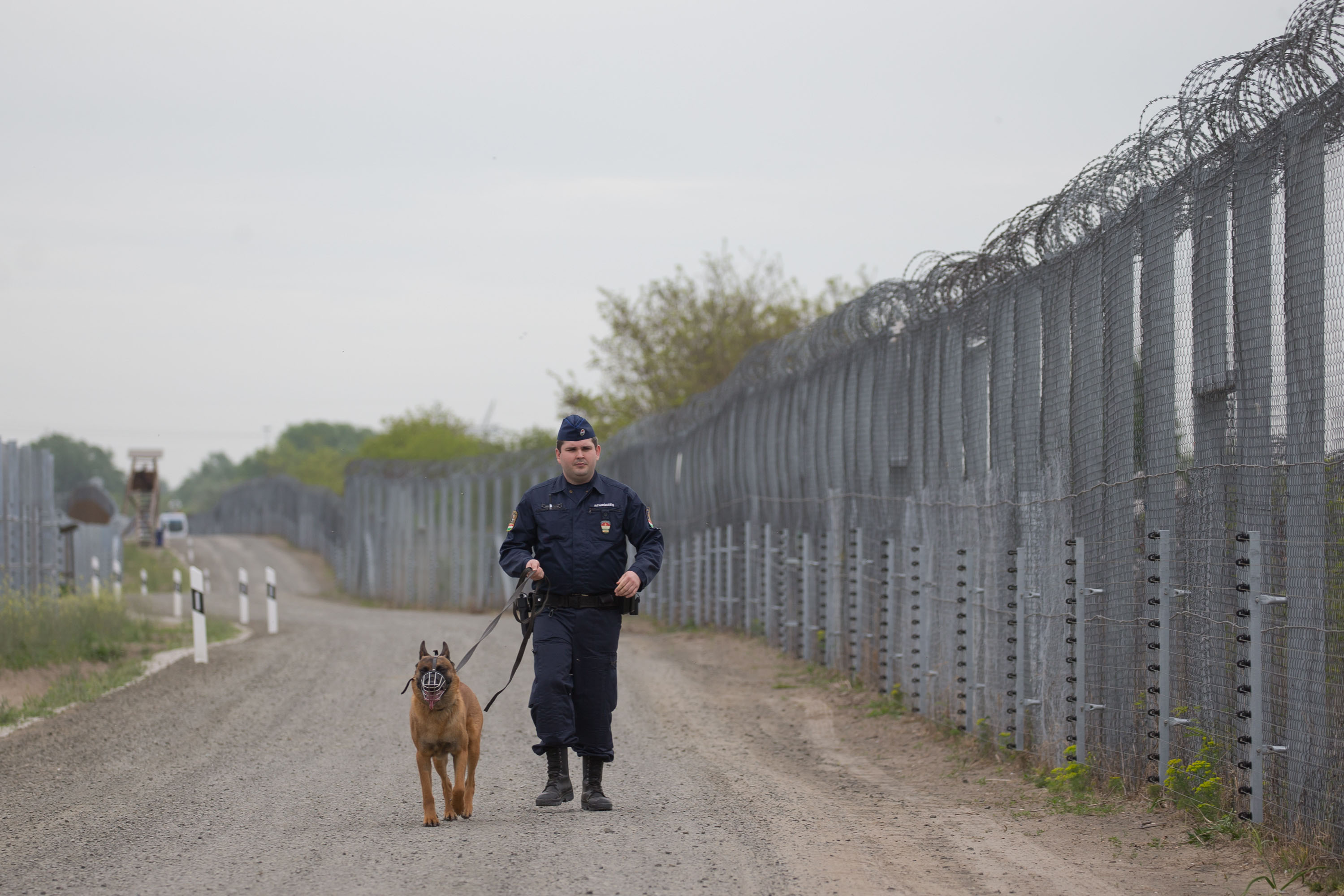
A police officer with a dog patrols along a temporary border fence along the Hungarian-Serbian border near Roszke, 180 kilometers southeast of Budapest, Hungary, in April 2017. The construction of a second line of fences aimed at preventing migrants’ illegal entry into Hungary had just been completed along the 155-kilometre border between Hungary and Serbia. Photo: © Attila Volgyi Xinhua / Eyevine / picturedesk.com
Meanwhile, as Frontex expands its footprint into non-EU countries in Southeast Europe, critics say agreements between the agency and Western Balkan governments will allow Frontex staff to operate with a worrying level of impunity for any wrongdoing. They say the agreements speak volumes about the degree of accountability and transparency surrounding the actions of one of the European Union’s fastest-growing agencies.
Questions of complicity
Known officially as the European Border and Coast Guard, Frontex was set up in 2004 to coordinate control of the EU’s external frontiers by member states. In more than a decade, experts say Frontex has grown to become one of the most powerful European Commission agencies — but dependence on the resources of EU member states has limited its ability to operate.
Now, with a new mandate allowing it to deploy its own armed and uniformed border guards, plus a hefty budget of 11 billion euros for the next EU budget cycle 2021-2027, the Warsaw-based agency is rapidly transforming into a force to be reckoned with. But as Frontex flexes its muscles, controversy dogs it.
Between the autumn of 2016 and winter of 2017, well before its new mandate, prominent humanitarian and rights organisations alerted the European Commission and Frontex to the alleged use of extreme force by Hungarian authorities working alongside Frontex agents when dealing with people trying to cross irregularly from Serbia. The organisations included the UN refugee agency (UNHCR), Médecins Sans Frontières (MSF), Amnesty International, Human Rights Watch and the Hungarian Helsinki Committee.
The groups also said refugees were being denied proper access to asylum procedures in Hungary, prompting UNHCR to warn that summary expulsions back to the non-EU side of the border were very likely a violation of international law. A file of internal Frontex documents acquired through freedom-of-information requests by the pro-refugee-rights Hungarian Helsinki Committee — and analysed by BIRN — shows that Frontex management was fully aware of the allegations.
A March 2017 report by Frontex’s Fundamental Rights Officer to the agency’s management board — which comprises representatives of the European Commission and EU member states — cites one such case. On December 16, 2016, Hungarian guards opened a gate in the Serbian border fence and unleashed a police dog on a group of a dozen Afghans — most of them unaccompanied minors aged 10-17 — trying to cross into Hungary, according to the report.
Entering Serbian territory, the officers chased the migrants, pepper-sprayed them in the face and beat them with batons.
The dog bit three people, children among them. Entering Serbian territory, the officers chased the migrants, pepper-sprayed them in the face and beat them with batons. Their injuries were later certified by a medical team in a near-by transit camp.
Examination of the internal documents reveals a prolonged internal disagreement within Frontex about the role of the agency in supporting Hungarian border-control operations. The spat appears to have reached boiling point in the autumn of 2016, several months after Hungary introduced new legislation on border controls. The new law gave Hungarian officers the power to return refugees or migrants caught within eight kilometres of the frontier to the fence along the Serbian border, for detention in designated transit zones and summary expulsions to Serbia.
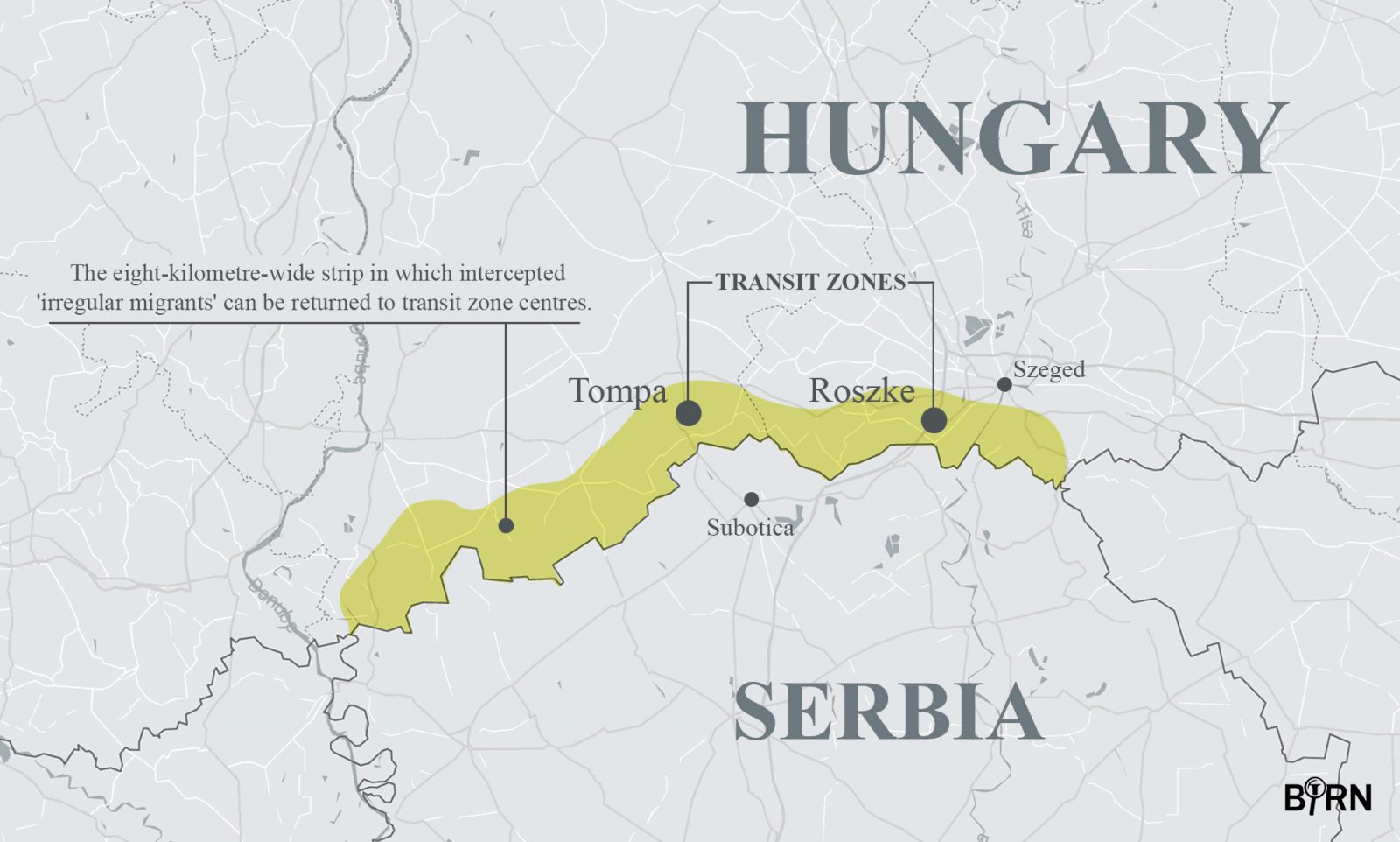
Illustartion: © Ewelina Karpowiak / Klawe Rzeczy.
In July 2016, Hungarian police recorded 1,701 cases of people escorted to Serbia, according to their own reports. In August 2016, this increased to 1,842. The documents show that the situation soon started to alarm Frontex’s Consultative Forum, an advisory body put together by Frontex itself and comprised of experts from other EU agencies, international organisations and rights groups. Its purpose is to oversee the agency’s compliance with human rights standards. Towards the end of 2016, the Consultative Forum recommended that Frontex suspend operations on the Hungarian-Serbian border.

Frontex executive director Fabrice Leggeri. Photo: © Florion Goga / Reuters / picturedesk.com
But Frontex Executive Director Fabrice Leggeri rejected the idea, the internal documents show. In a letter to a member of the European Parliament in March 2017, Leggeri said he made the decision so the agency could “guide, support and observe in accordance with Frontex standards”.
Internal advice ignored
In addition to disregarding the Consultative Forum’s recommendation, Leggeri failed to act on advice by Fundamental Rights Officer Inmaculada Arnaez, a Frontex official tasked with making sure the agency’s operations comply with European and international law. Arnaez warned repeatedly in the autumn of 2016 and winter of 2017 that Frontex risked being complicit in rights violations by Hungarian authorities, but her advice went unheeded — despite a stream of evidence presented to the agency by independent organisations. Arnaez did not respond to a request for comment from BIRN.
While claiming that evidence of violations was insufficient, Frontex managed the risk of exposure to any wrongdoing by limiting the agency’s engagement on the front line of the Hungarian-Serbian border. According to an advisory notice dated October 2017, Frontex officials deployed in the region were tasked with “border surveillance activities” and “interception of irregular migrants” inside Hungary within an area up to eight kilometres from the EU’s external border with Serbia.
However, they were specifically advised that escorting migrants to transit zones was to be “exclusively performed by Hungarian authorities”. “Frontex was always there at the beginning but they were never there in the end,” said Lydia Gall, a human rights lawyer at Human Rights Watch, who was working in the region at the time. “I remember many migrants telling me they were happy to have foreign police around since their presence meant better treatment by Hungarian border guards.”
In Gall’s view, the conspicuous absence of Frontex officers during the final stage of detention and pushbacks showed the agency was trying to disassociate itself from any legal violations or rights abuses during expulsions. “The treatment of people changed when loaded onto vans and taken off to the transit zones,” she said. “Why not monitor the entire sequence when you know things might happen to these people? Where is the efficiency in this process?”
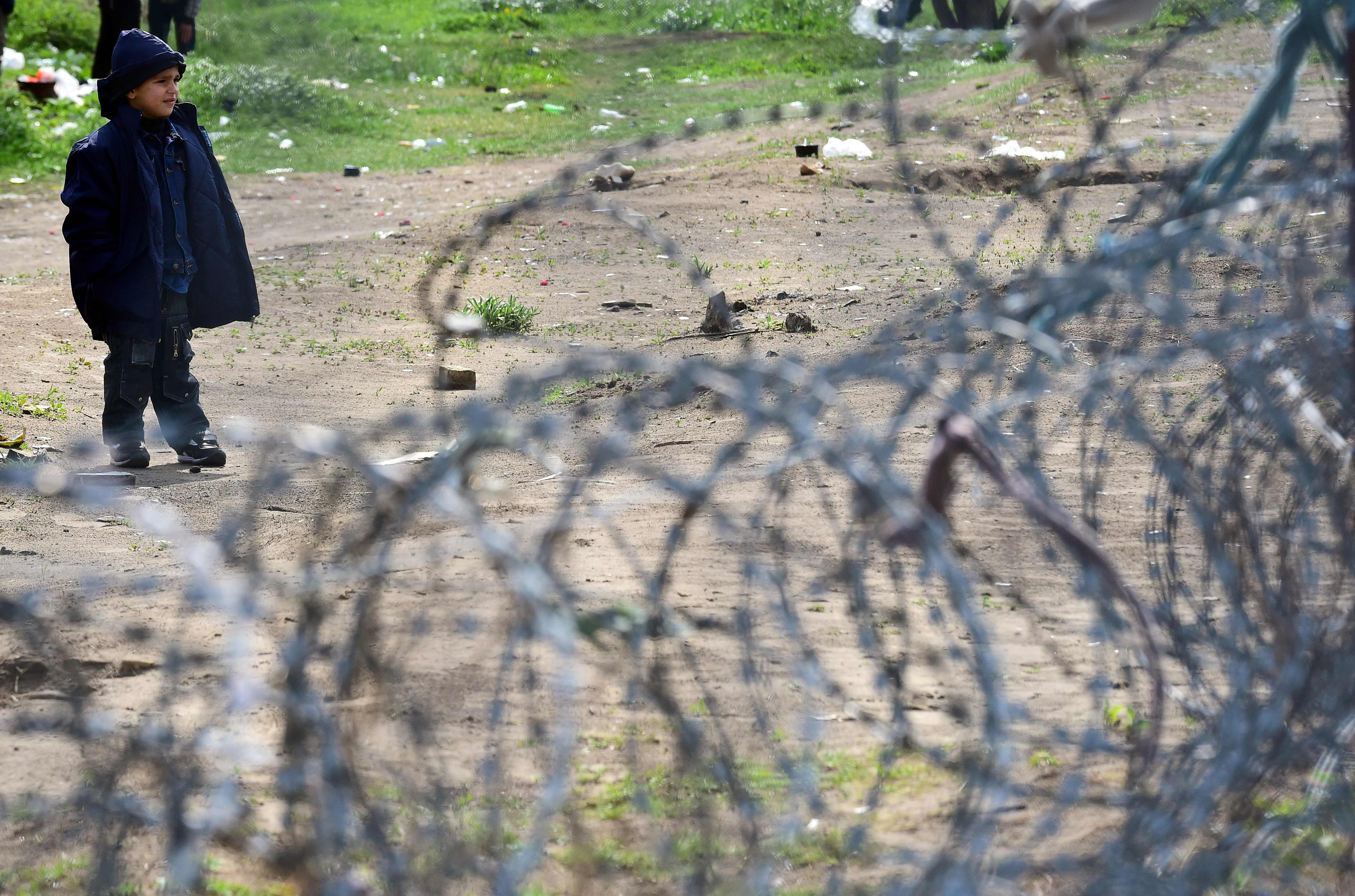
A kid waiting in front of the Hungarian border fence at the Tompa border station transit zone, 169 kilometres southeast of Budapest in April 2017. Photo: © Attila Kisbenedek / AFP / picturedesk.com
At the time, and under a state of emergency, Hungary was assembling a 3,000-strong armed force known as “border hunter action units” to put its new legislation on border controls into effect. Frontex officers assisted with the patrols — among them dog handlers apparently tasked with intercepting people who climbed over the fence into Hungary. Frontex regularly deploys dogs to pursue migrants and promotes this on its social media. Leggeri did not respond to BIRN’s request for an interview but the agency gave written replies to emailed questions.
It said Frontex deployed eight dog teams in 2016 and 17 in 2017 in Hungary. “They worked at border crossing points, helping with the detection of drugs and other illegal materials,” Frontex said. “They also helped detect clandestine entries. In addition, some teams assisted in patrolling the land border.”
“All officers deployed by Frontex are bound by a strict code of conduct and are compelled to respect fundamental rights. On the first day in the operational area, the officers receive an operational briefing that includes specific guidance on the respect of fundamental rights, referral procedures, complaint mechanism and the Schengen Border Code.”
“All officers deployed by Frontex are bound by a strict code of conduct and are compelled to respect fundamental rights.”
In the case of the Finnish team whose dog bit a migrant in October 2016, no investigation followed since Hungarian police considered the injury to be “accidental” and said the dog was used in accordance with Hungarian law, according to the internal report on the incident. Three days after the incident, on October 14, 2016, Frontex Fundamental Rights Officer Arnaez filed an internal memo raising concerns that Frontex “might be operating under conditions which do not commit to the respect, protection and fulfillment of the rights of persons crossing the Hungarian-Serbian border”.
She suggested that the agency “may wish to revise its support to operational areas” where repeated allegations of violations of EU, regional and international law had occurred. A month later, on November 10, the Consultative Forum issued its recommendation — the first of its kind — to the executive director and the management board of Frontex “to immediately take action” and “suspend operational activities at the Hungarian-Serbian border”.
“Operational support at the Hungarian-Serbian border must be contingent upon Frontex being satisfied that people arriving at that border are duly registered by Hungarian authorities, given access to an individualised procedure and to asylum, if they so wish, are not summarily returned to Serbia, and that instances of police abuse and violence are investigated in an independent and impartial manner,” it said.
Three institutions in the Consultative Forum “requested their abstention from the issuance of this recommendation”, according to the document. They were the Council of Europe, the European Asylum Support Office and the EU Agency for Fundamental Rights. After an exchange of correspondence, Leggeri and the European Commission’s Directorate-General of Migration and Home Affairs, an office then managed by Matthias Ruete, concluded there was insufficient evidence that systemic violations had occurred.
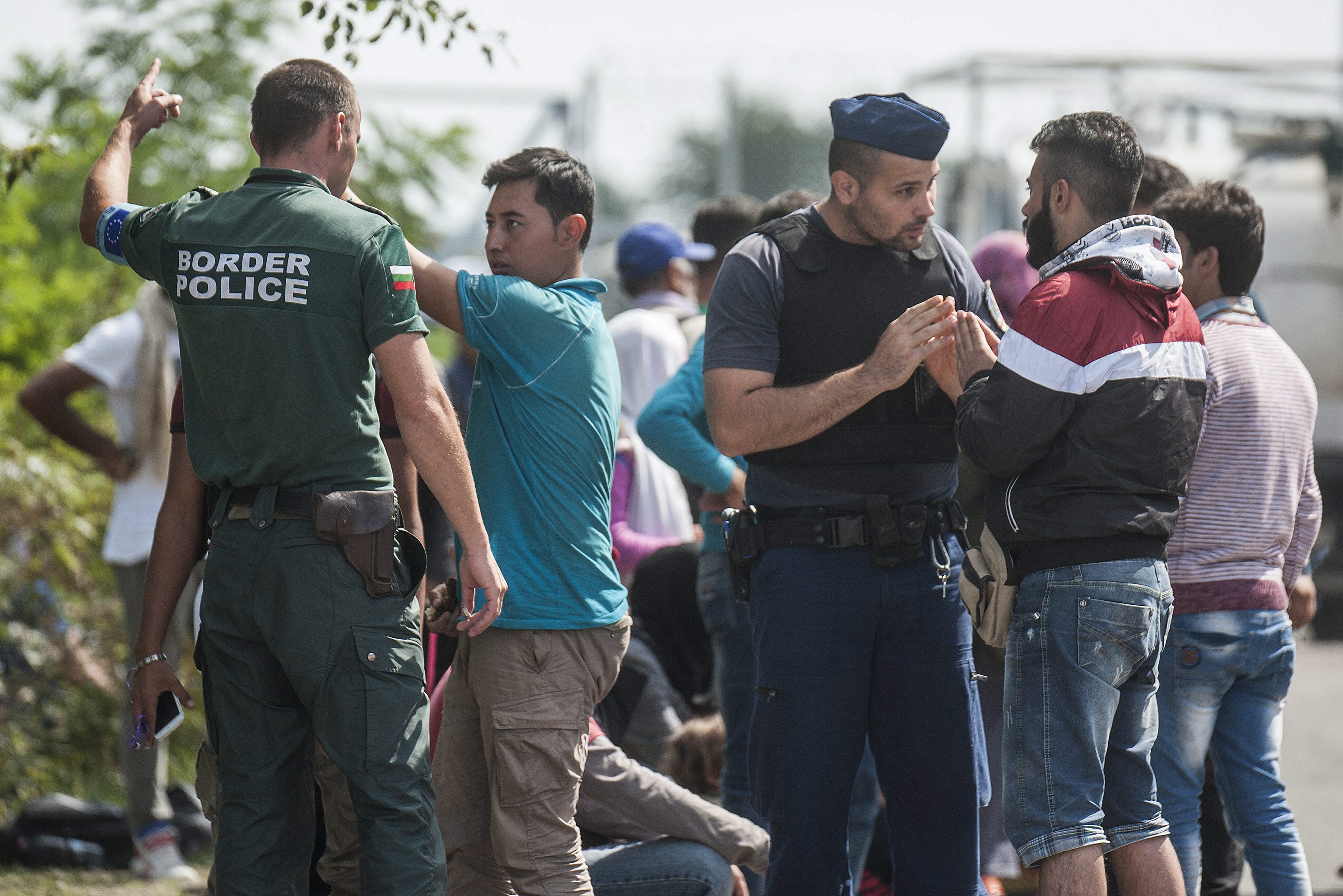
A Bulgarian member of Frontex and a Hungarian police officer engage with migrants in Röszke, 180 kilometres southeast of Budapest, Hungary, in September 2015. Photo: © Sandor Ujvari / EPA / picturedesk.com
Their conclusion was based on the findings of a “technical mission” by the European Commission to Hungary on October 18-19, 2016, during which they “did not find evidence of any such systematic practices”, according to Leggeri’s written response to the Consultative Forum’s recommendation.
‘Intentional injuries’
Following consultation with the agency’s management board, Leggeri informed the Consultative Forum on February 1, 2017 of his decision not to suspend operations. His letter concluded that “the alleged cases of illegitimate use of force by Hungarian police, if confirmed, did not occur within the operational activities coordinated by Frontex”. Furthermore, “the non-confirmed allegations regarding the illegitimate use of force and the absence of reports in the framework of Frontex operational activities cannot sustain a decision to suspend the joint operation”.
In her memo, Arnaez cited a Hungarian police report from August 2016 that said officers dealt with 4,148 “illegal entry attempts”, “prevented entry” in 2,306 cases and escorted 1,842 people from transit zones back into Serbia. “In total 8,296 persons were subjected to these summary measures in the period of 30 days,” she wrote. Anneliese Baldaccini, an expert on EU migration at Amnesty International who sat on the Consultative Forum, told BIRN that external evidence was too easily downplayed.
“I would tend to believe that evidence of wrongdoing was sufficient both in law — the European Commission after all started an infringement procedure with respect to Hungary’s border procedures, and the same institution sits on the management board of Frontex — and in practice, given the persistent and consistent cases documented from a variety of open sources,” Baldaccini said.
“I would tend to believe that evidence of wrongdoing was sufficient both in law … and in practice, given the persistent and consistent cases documented from a variety of open sources.”
In July 2018, the European Commission took Hungary to the Court of Justice of the European Union, the second step in an infringement procedure launched in 2015 for non-compliance of its asylum and return legislation with EU law. A year later, it brought a second case to the court against Hungary for criminalising activities in support of asylum seekers. It also initiated a third infringement procedure against Hungary for denying food to asylum seekers in transit zones at the border with Serbia.
Baldaccini continued: “So lack of action — in this instance, the CF [Consultative Forum] requested suspension of operations in Hungary — seems to be motivated by a low number of Serious Incidents Reports and lack of complaints received by Frontex through the complaints mechanism.” Frontex staff or officers from EU member states deployed by Frontex are required to file Serious Incident Reports (SIRs) whenever they become aware of any anomalies associated with the agency’s operations.
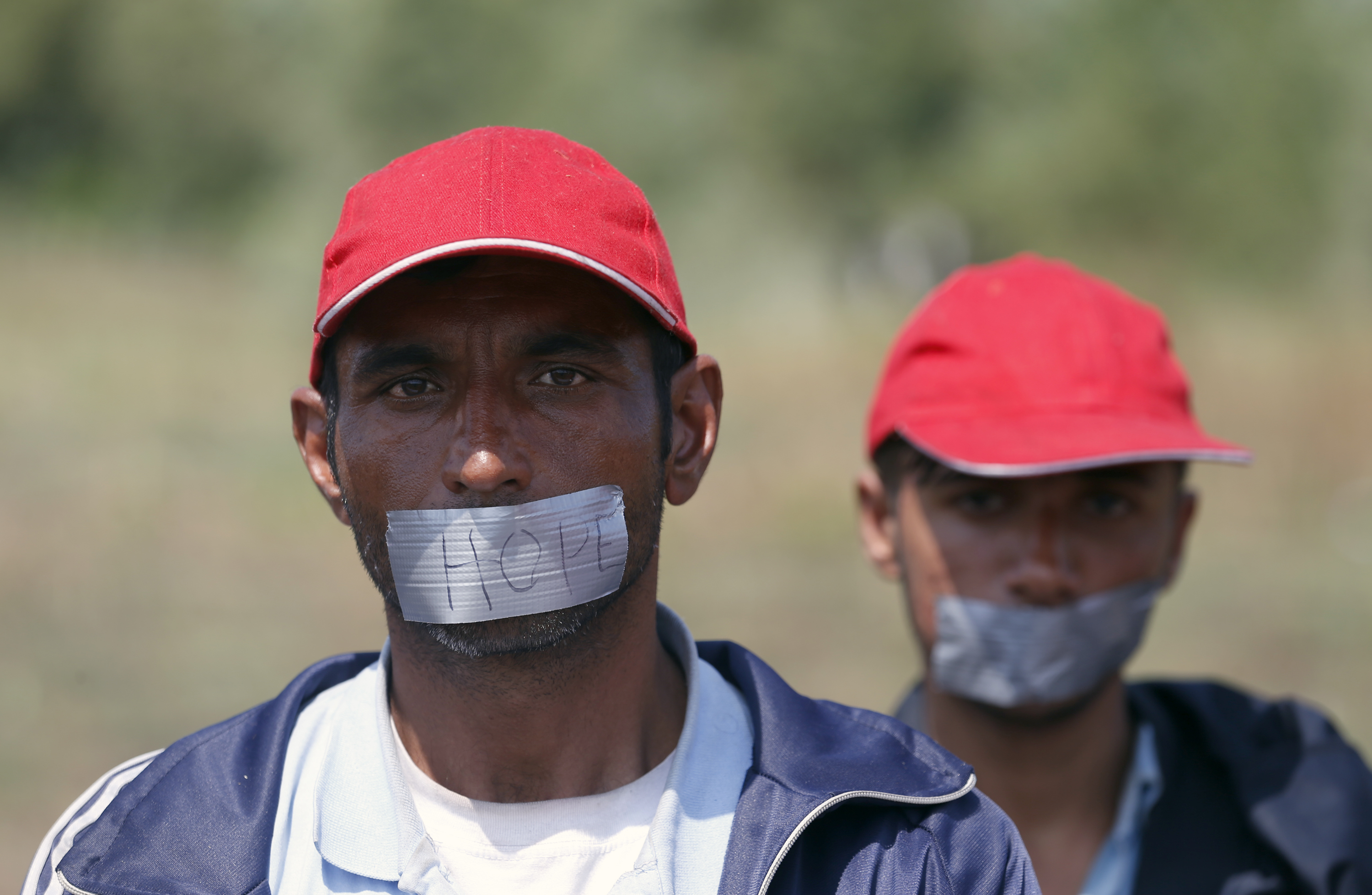
Migrants tape their mouths as they stage a protest at a makeshift camp for migrants in Horgoš, Serbia, meters away from the border with Hungary, in July 2016. Photo: © Darko Vojinovic / AP / picturedesk.com
Internal documents show that Leggeri seemed not only untroubled by the effectiveness of Frontex’s mechanisms to monitor abuses — but he also used the dearth of SIRs as a justification for disregarding evidence presented by international organisations. In his response to the Consultative Forum, Leggeri mentioned that fact-finding carried out by the Operations Division resulted in only three SIRs in 2016 through Frontex’s internal reporting system — and all “not involving members of the European Border and Coast Guard teams”. (Given the SIR about the Finnish dog handling team deployed by Frontex, Leggeri’s statement appears not entirely accurate.)
Asked by BIRN how it decided that the three SIRs were alone sufficient to justify a decision on whether or not to suspend operations, the agency replied: “Frontex was informed by the Hungarian authorities that they investigated the incidents in question and found them not credible based on evidence. It is important to note that, under the European Border and Coast Guard Regulation of 2016, Frontex was not provided power to investigate. National authorities are to follow up on charges in SIR reports.”
Statistics show that Frontex officials rarely file SIRs, despite their obligation to do so whenever something of note happens. Throughout 2018 and during the first half of 2019, Frontex co-financed and coordinated 508 forced return flights for migrants and asylum seekers who had made it to EU countries. In those 18 months, only one Serious Incident Report was filed. However, such a paucity of reports does not square with the sheer number of allegations coming from the ground.
A Council of Europe human rights expert who sat on the Consultative Forum and advised Frontex’s management board said in an interview in September that “the internal system of Frontex produces close to nil reports on serious incidents. In other words, the internal system of Frontex says there is never a human rights incident.” In a meeting in April 2017, MSF representatives told Leggeri that between March 2016 and February 2017, the medical charity treated 106 cases of “intentional injuries” allegedly inflicted by Hungarian border patrols monitoring the southern frontier.
MSF said the injuries were consistent with frequently reported acts of violence attributed to Hungarian authorities: kickings, beatings with fists or batons, bites by police dogs and inflammation caused by teargas or pepper spray. Of the 106 cases, 22 of the alleged victims were minors. According to an MSF representative who attended the meeting, Leggeri again cited an absence of reports filed by Frontex officers as a reason not to take action. Asked about MSF’s report of more than 100 “intentional injuries”, Frontex told BIRN that Hungary had followed up on the allegations. “Frontex was informed by the Hungarian authorities that they investigated the [MSF] report in question and found them [the abuse allegations] not credible based on evidence.”
“Frontex was informed by the Hungarian authorities that they investigated the [MSF] report in question and found them [the abuse allegations] not credible based on evidence.”
In March 2017, a month after Leggeri’s decision not to suspend operations, Fundamental Rights Officer Arnaez made a field visit to see Frontex’s operations in Hungary. The eight-page redacted version of her post-visit report, filed on March 14, 2017, again raised concerns about aiding and abetting violations by Hungarian authorities. According to Arnaez, the agency risked contributing to “action that lacks guarantees to ensure access to asylum and international protection procedures”.
Furthermore, Frontex was exposed to the potential risk of contributing to “chain refoulement and inhumane and degrading treatment”. She concluded that “the risk for shared responsibility of the agency in the violation of fundamental rights” remains “very high”. Refoulement — the forcible return of asylum seekers to places where they risk persecution — is not allowed under EU or international law.
Stefan Kessler, chair of the Consultative Forum from October 2012 to December 2019, told BIRN the issue of Frontex operations in Hungary remained an open one. In its 2019 annual report, the Consultative Forum reiterated its 2016 recommendation that Frontex’s chief should take action to suspend operational activities. “The Consultative Forum has from November 2016 to the end of 2019 repeatedly advised the EBCG [Frontex] to suspend its operation in Hungary, without a positive response,” Kessler said.
Asked about the Consultative Forum’s persistence, Frontex told BIRN: “We cannot speak for the Consultative Forum. But we would highlight that the presence of officers deployed by Frontex and its staff can actively contribute to minimise any possible risk of a misuse of force, as well as to provide an objective and reliable source of information on all the circumstances on the ground.”
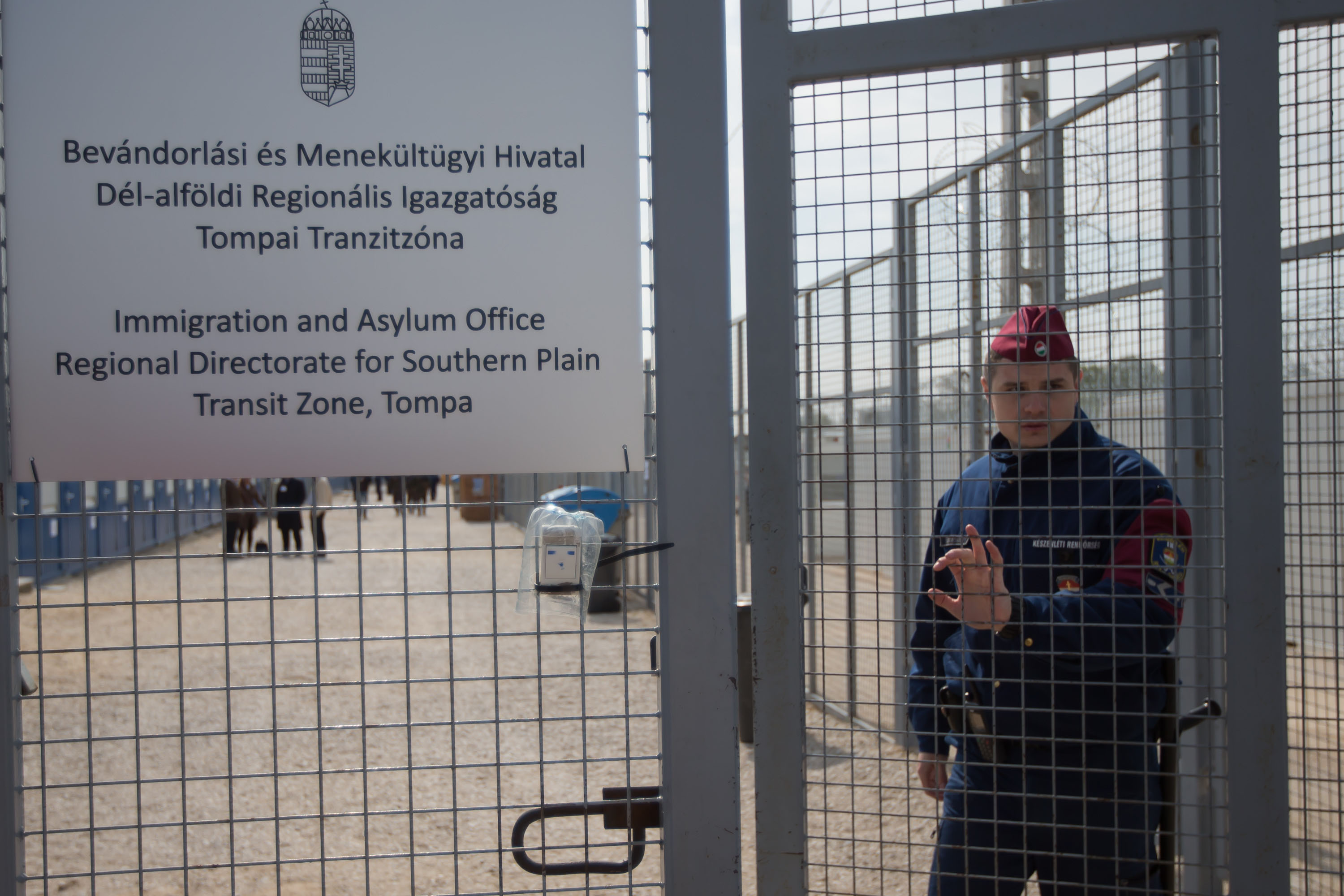
A Hungarian police officer at the transit zone housing asylum seekers on the Hungarian-Serbian border near Tompa, Hungary in April 2017. The complex is one of two new detention centers for asylum seekers in the Hungarian transit zone and contains shipping containers that are used to automatically detain migrants in the transit zone while their claims are investigated. Photo: © Attila Volgyi Xinhua / Eyevine / picturedesk.com
Catherine Woollard, director of the European Council for Refugees and Exiles, a refugee rights group based in Brussels, said Frontex had an obligation to invest in efforts not only to prevent violations of fundamental rights but also to promote fundamental rights in the places it works. “If not, it may be held liable for the actions that result, including of member-state-deployed officers, when there was a risk and there are preventive actions it could have taken but did not.”
Immunity and impunity
Analysts say Frontex’s support to Hungary’s border operations has been key to maintaining control over the Western Balkan migration route — a priority for the European Commission and most EU member states. Thanks to a new regulation that came into force in early December, Frontex is expected to play an increasing role in the Balkans — and not only in EU states.
The agency already administers a 3.4-million-euro programme to help Western Balkan countries improve the way they identify and register migrants and asylum seekers. It has also earmarked millions of euros in investments for container offices, border control vehicles and surveillance tools. And for the first time, it is assembling a statutory force of Frontex border guards. With 700 initial recruits, the force will likely be deployed to the Balkans by early 2021. The agency has already set foot in the Balkans outside the EU, with 50 officers seconded by member states deployed to Albania in May 2019.
That operation aims to tackle irregular migration and beef up border controls on the Albanian-Greek frontier. It also focuses on combating cross-border crime including arms and drug smuggling, both big problems in the region. Expanding Frontex’s ability to carry out operations in third (non-EU) countries serves a bigger strategic objective of establishing EU executive power in the region, analysts say. Along with its expanded mandate, Frontex needs so-called Status Agreements with individual countries if it is to operate in non-EU states in the Western Balkans. It signed the first of these last May, with Albania.
By the end of November 2019, Frontex had concluded similar agreements with Montenegro and Serbia. Status Agreements with Bosnia and Herzegovina and North Macedonia are in the works. Ironically, Dimitris Avramopoulos, former European Commissioner for Migration and Home Affairs, hailed the signing of the agreement with Montenegro as “one more step towards bringing the Western Balkan region closer to the EU” — 10 days before the EU blocked Albania and North Macedonia from starting accession talks.
MEPs have also endorsed the Status Agreement with Montenegro as “crucial to ensure transparency, public scrutiny and democratic oversight on Frontex’s cooperation with non-EU states”. A closer examination of the concluded Status Agreements, as well as drafts of the pending ones, published by EU policy watchdog Statewatch, raises questions about the level of immunity offered to Frontex officers deployed in the field.
Under the agreements, Frontex staff will enjoy, in principle, immunity in the country of deployment from criminal, civil and administrative liabilities arising from actions undertaken in the course of their duties — much as UN peacekeepers and members of other international organisations deployed worldwide enjoy.
If a staff member is accused of an offence, it is up to the executive director of Frontex to decide whether the offence was committed in the course of duties as foreseen in the mission’s operational plan. If the answer is yes, no legal proceedings can be initiated against the staff member. Otherwise, the law of the country hosting the mission applies. The decision of the executive director of Frontex shall be “binding upon the jurisdiction of the states”, the Status Agreements say.
Essentially, the head of Frontex is deemed the only authority able to greenlight the prosecution of Frontex personnel in Balkan countries, since without his or her consent no proceedings can be initiated. That does not mean that Frontex agents cannot be prosecuted in their home countries, however. For example, Article 7 of the Status Agreement with Montenegro reads: “The immunity of members of the team from the jurisdiction of Montenegro shall not exempt them from the jurisdictions of the respective home Member States.”
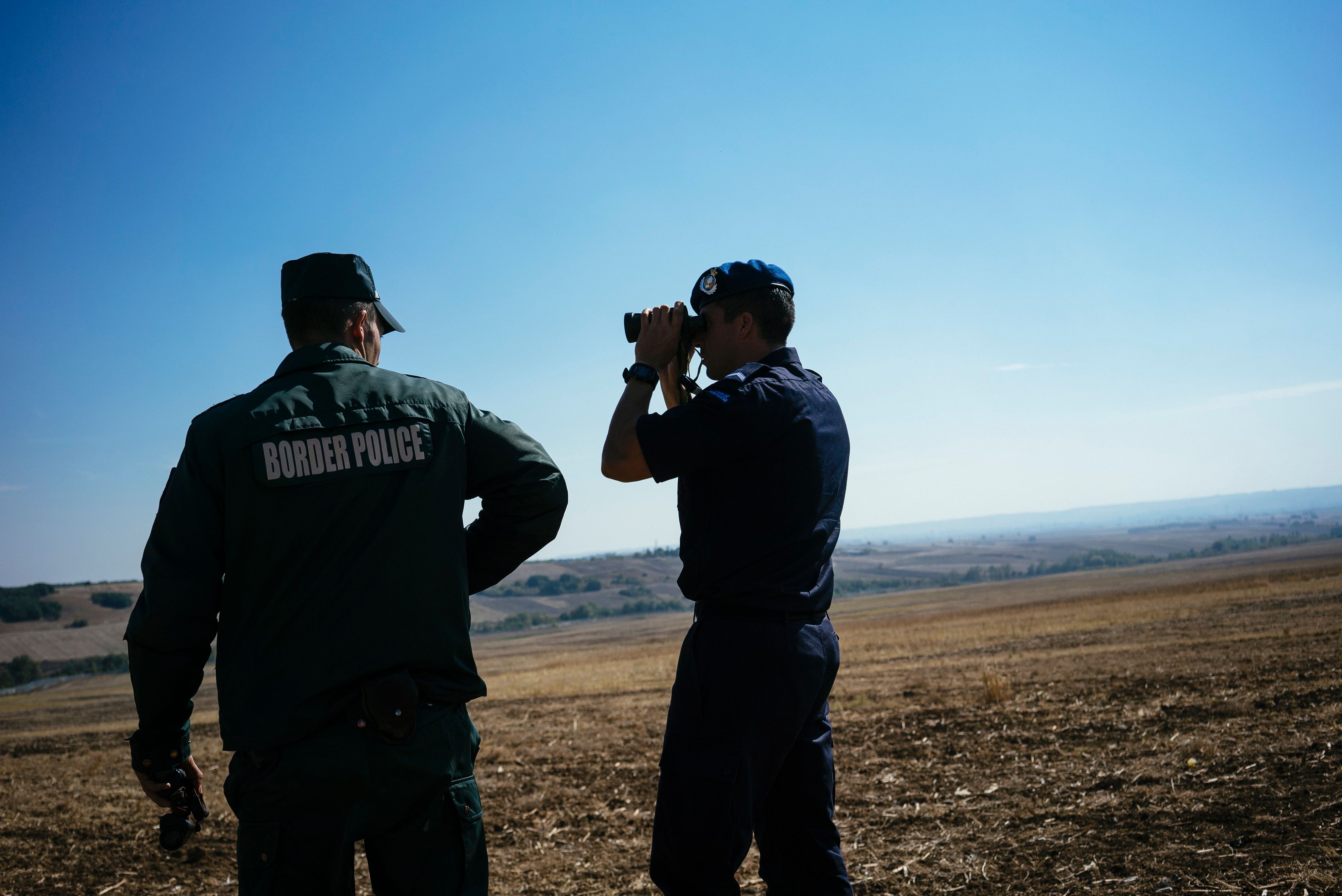
Frontex officers from the Netherlands (right) and Bulgaria monitor the border between Bulgaria and Turkey at the Kapitan Andreevo checkpoint in southeast Bulgaria in October 2016. To protect Europe’s external borders, the EU’s Frontex border patrol force is to be expanded to up to 10,000 troops by 2027. Photo: © Dimitar Dilkoff / AFP / picturedesk.com
The Status Agreements also stipulate that members of Frontex missions can carry weapons and make use of them when they operate. The issue of accountability and criminal liability is further complicated by the ongoing recruitment of the EU Border Guard statutory force, which will eventually be part of a permanent force of 10,000 people. Since Frontex will soon be able to deploy its own statutory staff alongside border guards seconded by member states, the right to carry weapons has been extended to all standing corps personnel working for Frontex.
European Council for Refugees and Exiles Director Woollard said the decision did not come easily for Western Balkan countries. “The EU insisted on immunity while the countries of the region wanted the same treatment as for local officers,” she said. “This disparity is a source of deep and justified resentment. There is history here: the situation is analogous to that of the EU’s CSDP [Common Security and Defence Policy] missions, and other international missions, in the Balkan region where impunity has prevailed for deployed officers, including for serious international crimes.”
The European Council for Refugees and Exiles has warned since November 2018 that the arrangement could result in impunity for crimes committed by Frontex statutory staff. It advised that until and unless clear liability rules are in place, nobody hired directly by Frontex with the power to police borders should be deployed to third countries under existing agreements. “The EU’s borders don’t move; other countries transfer border management functions to the EU,” Woollard said.
“In the Status Agreements for the Balkans, executive powers for border management functions of the countries concerned are combined with immunity from the jurisdiction of those countries, creating a situation of power without accountability and undermining the sovereignty of those countries.” Frontex says it intends to address concerns by applying a strict code of conduct. “The Code of Conduct is applicable to all persons participating in Frontex operational activities independently whether they are conducted on the territory of the EU or outside of it,” the agency said in its written response to BIRN’s questions.
“The Code of Conduct is applicable to all persons participating in Frontex operational activities independently whether they are conducted on the territory of the EU or outside of it.”
“It lays down procedures intended to guarantee the principle of the rule of law and the respect for fundamental rights with particular focus on vulnerable persons, including children as well as on persons seeking international protection.” Additional concerns arise given that the European Commission and Frontex have long avoided putting in place a clear framework regulating accountability issues.
The European Commission and Frontex delayed for years the creation of a complaints mechanism despite repeated requests from the European Ombudsman in 2013 and the European Parliament in 2015. Since one was finally introduced in September 2016, the Consultative Forum and the European Commission’s Fundamental Rights Agency have consistently raised questions about the effectiveness of the agency’s accountability mechanisms.
Last November, at a conference in Athens, a Frontex official described the complaints mechanism as still “under construction”, with only 41 complaints received since 2016. Woollard said the remedies available to an individual who wants to take action are — and will remain — limited. “The EU is not party to the European Convention on Human Rights, so that avenue is closed,” she said. “An action for damages or the use of the Frontex complaints mechanism are possible but require time, resources, information and legal advice to pursue, which are often not in place for an individual victim.”
The expansion of the agency’s mandate to act extraterritoriality also indicates a shift in the EU’s priorities for the region, according to Woolard. “Rather than using its considerable leverage in the region to support positive developments, the EU uses it to buy cooperation on migration control,” she said. “It also turns a blind eye to violations taking place; certain European leaders actively encourage them.”
First published on 6 February 2020 on Reportingdemocracy.org, a journalistic platform run by the Balkan Investigative Reporting Network.
This text was produced with a Reporting Democracy grant and is protected by copyright: © Apostolis Fotiadis. If you are interested in republication, please contact the editorial team.
Copyright information on pictures, graphics and videos are noted directly at the illustrations. Cover picture © Ewelina Karpowiak / Klawe Rzeczy